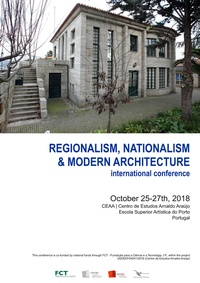Regionalism, Nationalism & Modern Architecture

International Conference
Issued by
CEAA | Centro de Estudos Arnaldo Araújo [Arnaldo Araújo Research Center]
of Escola Superior Artística do Porto, Portugal
In 1954, S. Giedion argued that even in the most international component of Modern architecture never lost the mark of its regional origin. He believed that "regional contributions may lead to an universal architectural concept" and give as examples Tony Garnier and Auguste Perret works that, from his point of view, are directly rooted in the French building tradition or Mondrian's "neutral forms" and abstract plan surfaces of Theo van Doesburg's and C. van Eesteren that can be explained by abstract forms of the colored horizontal plans of Dutch landscapes and the vertical plans of its traditional buildings' plain façades.
Similarly, M. Sabatino draws attention to the way in which the Italian architects in the 1930s resumed the courtyard house of both classical and vernacular tradition in clearly modern designs, and in a text of 1961, concerning the work of F. Távora, N. Portas argues that after the survey to regional architecture, made by Architects Union in the 50s, a "third way" comes up in Portuguese architecture, which uses tradition in the construction of modernity.
However, the intersection between the local cultural tradition and modern architecture does not always take this path. On the contrary, the acceptance of the Modern Movement is full of ambiguities, dualities and regionalist derives which are often associated with the construction of national identities.
In association with the ongoing research in the framework of the axis Architecture, Territory, Landscape of the Architectural Studies research group of CEAA, this conference aims to discuss the background, conditions, particularities, consequences and significance of local reception of and contribution to Modern Movement.
Porto, Auditório da ESAP | 25-27 de Outubro, 2018